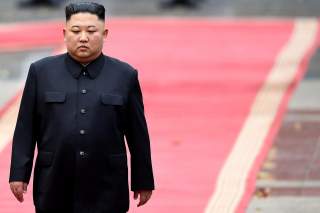Why North Korea Won't Succumb to 'Maximum Pressure'
How many more bets on North Korean surrender can America afford to go wrong?
A “bloody nose” targeted strike on North Korean nuclear facilities does not solve the problem either. Former Director of National Intelligence Dennis Blair warned about the unreliability of this option: “With all the tunnels they have, with all of the difficulties of intelligence in that country, I don’t think an American-South Korean strike [on the North] would have a high probability of taking out all of their nuclear capability.”
Without a deal, and without military solution, we are at high risk of sliding back by default into the Obama era’s “strategic patience” policy. This amounts to kicking the can down the road until North Korea surrenders, or until the next administration comes along, leaving Kim free to perfect his weapons.
“Hanoi-plus”
If sanctions cannot disarm North Korea, then there is nothing fundamentally wrong with what was on offer in Hanoi. Kim proposed verifiable measures that would directly improve U.S. national security by freezing the development of the North Korean nuclear arsenal. There is likely room to negotiate on what fissile material production facilities this encompasses, and exactly how much sanctions relief can be granted for such an action. The partial sanctions relief Kim asked for would still leave more than enough to make an example of North Korea and effectively deter other countries from getting nuclear weapons. A surrender may not be within grasp, but a compromise is.
The president visibly understands that there can be no coercive solutions. Not everybody in his administration seems to agree, though. At a March 15 press conference, Vice Foreign Minister Choe praised Trump as having been “flexible” on sanctions relief back in Hanoi. By contrast, she accused Bolton and Secretary of State Mike Pompeo of having poisoned the negotiation with uncompromising demands. On March 22, Trump also publicly contradicted the Treasury by declaring the withdrawal of new sanctions tied to North Korea. It is not entirely clear what these sanctions were, but they had visibly been decided without his knowledge. Trump is playing a much more difficult game than Kim if part of his own team is working against him.
Trump was definitely on a tightrope in Hanoi and had legitimate tactical reasons not to sign off then. He has a lot more room to maneuver now that he has been cleared of collusion and obstruction of justice, and now that the danger of diplomatic failure with North Korea is starting to sink in. A deal is possible, if only the stars align. If he can rein in escalatory moves from his team, if South Korean leader Moon Jae-in can convene a rematch, and if Kim can set up a good strike for him, Trump can then score a “Hanoi-plus” deal that makes everybody look victorious.
Henri Féron is a Post-Doctoral Research Scholar for the Center for Korean Legal Studies at Columbia University. The views expressed by the author do not necessarily reflect the views of the Center for Korean Legal Studies. Follow him on Twitter @henriferon.
Image: Reuters

